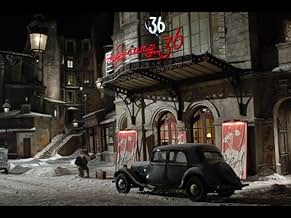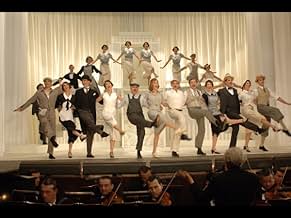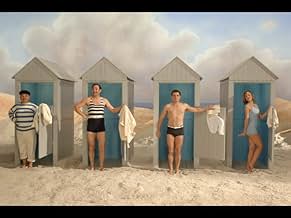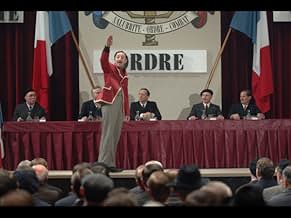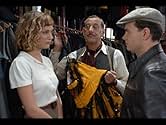VALUTAZIONE IMDb
6,5/10
2998
LA TUA VALUTAZIONE
Aggiungi una trama nella tua linguaWhen Chansonia, a nightclub, is shut down by the landlord, the stage manager Pigoil is forced to look for a new job. He finds hope when he discovers a young woman with a lovely singing voice... Leggi tuttoWhen Chansonia, a nightclub, is shut down by the landlord, the stage manager Pigoil is forced to look for a new job. He finds hope when he discovers a young woman with a lovely singing voice.When Chansonia, a nightclub, is shut down by the landlord, the stage manager Pigoil is forced to look for a new job. He finds hope when he discovers a young woman with a lovely singing voice.
- Regia
- Sceneggiatura
- Star
- Candidato a 1 Oscar
- 3 vittorie e 7 candidature totali
Recensioni in evidenza
Nora Arnezeder reminds me of movie stars of the thirties : beautiful, charming, she can sing, dance, act... Star quality ! As for the film itself, the story is rather simple, which I come to realize, is often what makes it good. It's not so much what the story is about but rather how you tell it. And in that case, you get to laugh, cry, you care about that Pigoil who looses his job, his wife and even his son and who doesn't lose hope, about Milou and Douce's love story. You'll love the great new songs, the homage to Busby Berkeley, Jacky's lousy jokes (a reprise of Kad's own TV skit) and secondary characters played by first-rate comedians like François Morel and the great Pierre Richard. What's not to like ?
This movie was a surprising little gem. I knew nothing about it and went with some friends yesterday on a whim. It was beautifully photographed and the rendition of 1936 Paris seemed quite authentic. The costumes were exquisite, the story is engaging, and of all the characters were genuine. The scenes in the theater left me smelling the greasepaint
I think this movie captured me because I was once heavily involved in local, amateur theater where we knocked ourselves out putting on shows just for the fun of it. I could identify with these characters struggling to eke out a living and dreaming of fame and success. The contrast of such joyous activities and the hopes of Pigoil, Douce and Jacky, amongst others against those dark times in Europe gives this movie a wonderful, entertaining balance.
It is well worth seeing.
I think this movie captured me because I was once heavily involved in local, amateur theater where we knocked ourselves out putting on shows just for the fun of it. I could identify with these characters struggling to eke out a living and dreaming of fame and success. The contrast of such joyous activities and the hopes of Pigoil, Douce and Jacky, amongst others against those dark times in Europe gives this movie a wonderful, entertaining balance.
It is well worth seeing.
It's difficult to explain this film's charm, but suffice it to say that if you love Paris and films about it, this portrayal of the city in 1936 will sweep you off your feet. At two hours long and in French, the movie may seem off-putting at first, but go with the flow and savor the fine direction, cinematography, sets, and the original music by Christophe Barratier. The story takes place in and around a Paris music hall, the proprietor of which has been charged with murder; during his confession we learn the story of the music hall in flashback performances. Even the kindest critics dismissed the film as what one called "a gleaming hunk of French period schmaltz." Exactly what I liked about it.
I loved it! Boz Luhrmann meets Cinema Paradiso in numerous ways. The plot is simple, as others here have already described. But it retains an abundance of charm. The undercurrents of antisemitism and fascism that were persistent in 1936 France are themes rarely seen on screen. Ditto for the Communist workers' movement during the same time. The clashes between these two groups were inevitable, and this film depicts that struggle brilliantly, without preaching to us or hitting us over the head with it. All the acting, singing and dancing are extremely well-done, and the cinematography, while Luhrmann-esquire is engaging. Best of all perhaps is the music. This film is destined to be a classic, and will always be on my favorites list. The only thing I would change is that I would retain the original title. The audience for this film is sophisticated enough to handle it.
This is not a great film, a masterpiece of cinema-as-art. It is, however, a wonderful movie that will delight you while you watch it and leave you with many happy musical memories after it has finished.
Though the director and star are the same, this movie does not resemble Les Choristes. It is, instead, an homage to French popular music of the 1930s (and 1940s). If you don't know that music and the stars who made it famous, you'll miss the many references. The movie will still be enjoyable, but it won't evoke the memories (and pleasures) that it would to French viewers over 60.
The music, most of it original, nevertheless comes very close to pastiche of popular numbers from that era. (One repeated number is very close to Messager's "Clou clou," which I think is from his Véronique.) The performances and characters also allude to stars of the past, though not necessarily in a one-on-one way. There is the music hall singer Tony Rossignol, whose light lyric tenor recalls Tino Rossi, though his Spanish get-up and music recalls Luis Mariano. Kad Merad's character starts out doing terrible impressions, of animals and Fernandel. He finally has a hit when he starts singing like Charles Trenet. Even though the music is pastiche, it is sometimes very catchy, and very much caught me up.
One of the previous reviewers said that Clovis Cornilliac was made up as Jean Gabin but couldn't reproduce the latter's charisma. I hope he was not meant to recall Gabin, because he certainly doesn't. He's pleasant in his role, as is the female lead, but the star is definitely Gerard Jugniot, who gives yet another first-rate performance.
This won't make the viewing list for any course on French cinema, nor should it. But you'll definitely enjoy it.
P.S. I watched this movie again, about a year after my first viewing of it. While I still found it enjoyable, I realize, in rereading my review, that it was the last part, with all the music, that made the strong impression on me. One of the reviews written since my first one notes that the movie might have been more memorable if there had been more music spread throughout it, and I agree. The show the company originally stages is bad vaudeville, and bad vaudeville numbers have only limited appeal. The subplot concerning Galapiat and the French fascists is somehow disconnected from the rest. Having subsequently seen that same actor, Bernard-Pierre Donnadieu, in L'affaire Salengro, where he played someone on the other side of that fight, I realize how much better the issue could have been presented.
The film is definitely worth watching, and should please most viewers. Gérard Jugnot gives yet another very fine, very moving performance. I don't know how well it will repay repeated viewings, however. I don't know if I would want to watch it myself a third time.
Though the director and star are the same, this movie does not resemble Les Choristes. It is, instead, an homage to French popular music of the 1930s (and 1940s). If you don't know that music and the stars who made it famous, you'll miss the many references. The movie will still be enjoyable, but it won't evoke the memories (and pleasures) that it would to French viewers over 60.
The music, most of it original, nevertheless comes very close to pastiche of popular numbers from that era. (One repeated number is very close to Messager's "Clou clou," which I think is from his Véronique.) The performances and characters also allude to stars of the past, though not necessarily in a one-on-one way. There is the music hall singer Tony Rossignol, whose light lyric tenor recalls Tino Rossi, though his Spanish get-up and music recalls Luis Mariano. Kad Merad's character starts out doing terrible impressions, of animals and Fernandel. He finally has a hit when he starts singing like Charles Trenet. Even though the music is pastiche, it is sometimes very catchy, and very much caught me up.
One of the previous reviewers said that Clovis Cornilliac was made up as Jean Gabin but couldn't reproduce the latter's charisma. I hope he was not meant to recall Gabin, because he certainly doesn't. He's pleasant in his role, as is the female lead, but the star is definitely Gerard Jugniot, who gives yet another first-rate performance.
This won't make the viewing list for any course on French cinema, nor should it. But you'll definitely enjoy it.
P.S. I watched this movie again, about a year after my first viewing of it. While I still found it enjoyable, I realize, in rereading my review, that it was the last part, with all the music, that made the strong impression on me. One of the reviews written since my first one notes that the movie might have been more memorable if there had been more music spread throughout it, and I agree. The show the company originally stages is bad vaudeville, and bad vaudeville numbers have only limited appeal. The subplot concerning Galapiat and the French fascists is somehow disconnected from the rest. Having subsequently seen that same actor, Bernard-Pierre Donnadieu, in L'affaire Salengro, where he played someone on the other side of that fight, I realize how much better the issue could have been presented.
The film is definitely worth watching, and should please most viewers. Gérard Jugnot gives yet another very fine, very moving performance. I don't know how well it will repay repeated viewings, however. I don't know if I would want to watch it myself a third time.
Lo sapevi?
- QuizFaubourg is not French for "the district." It is a contraction of "faux bourg", French for "false town" and were used to designate smaller towns attached to larger towns or cities. A lot of these faubourgs were independent cities until they were attached to Paris and lost all independence around during the 17th and 18th century. A new outer wall was later erected around the city. These faubourgs, especially those on the East side, were usually blue collar, with a very active night life.
- BlooperWhen Jacky accidentally turns on the radio while Pigoil is talking to his wife and her new lover, the radio is very loud immediately after Jacky flips the switch. On this type of old tube amplified radio, it would take several seconds for the tubes to heat up and amplify any signal, and the volume would go up very slowly.
- ConnessioniFeatured in The 82nd Annual Academy Awards (2010)
I più visti
Accedi per valutare e creare un elenco di titoli salvati per ottenere consigli personalizzati
- How long is Paris 36?Powered by Alexa
Dettagli
- Data di uscita
- Paesi di origine
- Siti ufficiali
- Lingua
- Celebre anche come
- Paris 36
- Luoghi delle riprese
- Surtainville, Manche, Francia(beach scenes by the end)
- Aziende produttrici
- Vedi altri crediti dell’azienda su IMDbPro
Botteghino
- Lordo Stati Uniti e Canada
- 851.540 USD
- Fine settimana di apertura Stati Uniti e Canada
- 44.690 USD
- 5 apr 2009
- Lordo in tutto il mondo
- 12.940.622 USD
- Tempo di esecuzione2 ore
- Colore
- Mix di suoni
- Proporzioni
- 2.35 : 1
Contribuisci a questa pagina
Suggerisci una modifica o aggiungi i contenuti mancanti

Divario superiore
By what name was Faubourg 36 (2008) officially released in India in English?
Rispondi




